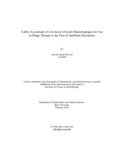Safety Assessment of Citrobacter freundii Bacteriophages for Use in Phage Therapy in the Face of Antibiotic Resistance

View/Open
Date
2020-02Publisher
Brac UniversityAuthor
Hossain, Sayema SyedaMetadata
Show full item recordAbstract
Citrobacter freundii is a species of bacteria in the Enterobacteriaceae family that is known to
cause hospital-acquired infections in the respiratory tract, urinary tract, blood, and other
normally sterile sites in immunocompromised patients and is growing resistant to multiple
antibiotics. In the current state of growing antibiotic resistance, phage therapy is one of the
alternatives being explored. Two of the biggest concerns regarding phage therapy are the virus'
ability to transfer antibiotic resistance or virulence genes through phage morons. After
comparison using Linux based BLAST between complete Citrobacter phage genomes
downloaded from the NCBI website and the Comprehensive Antibiotic Resistance Database
and the Virulence Factor Database, it was determined that none of the 21 phages showed signs
of carrying virulence or antibiotic resistance genes. Through phylogenetic tree construction
using Linux based Roary and web-based ITOL, it was determined that there is a possibility of
lysogeny in the phages
